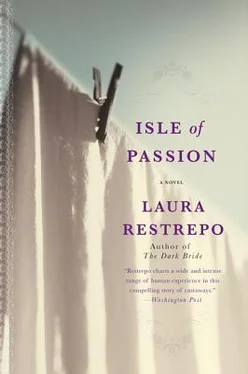Ramón opened one of the jalousies. Through the open window they saw the magnificent blue of the skies, high and limpid. Alicia remembered her dream. An image flashed through her brain, again showing her the paradise of the underwater world, and she was happy to be awake.
At this moment, life is also wonderfully perfect, she thought.
She looked at Ramón and the baby, who were both asleep, listened to their peaceful breathing and allowed herself to doze also.
It was hours later, or maybe minutes, that shouts from outside startled and woke them up. People were crying, calling out, running aimlessly. Ramón and Alicia opened their eyes and noticed that the piece of blue sky they had seen as bright and static had turned dark and was quickly changing from rose-colored to violet, and from violet to a voracious purple that swallowed everything. It was almost nightfall. The shouting was in crescendo and closing in.
Ramón hurried to the door still half asleep and, clumsily leaping over the porch steps, made his way through the circle of people, which opened for him. He saw in the center, lying on the pavement and covered with his own blood, the remains of a man. The dead man was Jesús Neri, the husband of Juana the midwife. He was an old soldier who had spent more time in Clipperton than the rest. They were all shouting at Arnaud about what had happened. There were different and contradictory versions, each one reflecting a particular vision.
The old man had been in the ocean up to his waist; no, up to his neck. He was next to the dock; no, not so close, ten yards from the dock. He was unloading from his barge some barrels he had brought from somewhere else on the isle. Five barrels that contained kerosene. No, not kerosene, fresh water. The old man wanted to carry drinking water from the dock to his home. Suddenly, they saw him flail his arms wildly. Victoriano saw him first; Faustino’s wife was the one who saw him first; no, it was some kids who started to scream.
The old man sank into the water and reappeared; one could see his head, his back, his arms, and then, he was gone. “He is being attacked by a manta ray,” shouted Victoriano. “It must be a jellyfish,” screamed Faustino’s wife. The children were shouting. Five men, no, they were four, six — three men and two women — came running to the dock. They saw him defending himself from the dark shadows attacking him, with his teeth, with his feet. They saw him helpless, overcome, with a plea for mercy on his face, with an expression that showed great pain, beseeched. Smacking the water with heavy sticks, the men scared off a school of sharks. There were three sharks; there were two sharks and a barracuda; it was only one enormous shark; there were six: five were black and one was white. The waters were red with blood by the time the men drove them away. Pedro managed to harpoon one of them; Pedro almost harpooned one. They rescued whatever was left of Jesús. When they got him out, he was already dead. When they got him out, he was still alive. Lying on the dock, he breathed with difficulty for a while, prayed to the Virgin of Guadalupe, and called out to his wife, Juana. Lying on the dock, he did not say anything, he just died without saying anything. He tried to sit up with whatever was left of his body, a spurt of blood came out from his mouth, and he died. Right after he died, blood came pouring out of his wounds, his nose, his mouth. Then they placed him on a large blanket, carried him to the entrance of the big house, and called out for Captain Arnaud.
Ramón was perplexed at so much damage, so much misery for this mangled old soldier, so much sadness at seeing this man reduced to a bloody rag. He was stunned, just standing there looking at him. His skill as a doctor’s apprentice was gone, his authority as governor had vanished, he had lost his capacity to react. He could only stand there, watching. The impact of the delivery was still too fresh, and the two images were juxtaposed, melded, confusing. Crouching next to the dead man was Doña Juana, sobbing quietly, evenly, with no overblown gestures or even tears, resigned to death since long ago, since forever.
The voice of Lieutenant Cardona broke the collective hypnosis of watching the corpse.
“We must bury him,” he said.
“We must bury him,” Ramón repeated mechanically. “We must find an appropriate place for a cemetery.”
The layer of soil in Clipperton was so thin that to bury a man was almost impossible. To cover the body with shovefuls of guano would be unsanitary and sacrilegious, and to dig a grave in the rock would be too arduous an enterprise. “Throw him into the sea,” someone suggested, but the idea of letting the sharks finish the job horrified Ramón. If the man had been a sailor and had died on the high seas, maybe they could have done that, but the old man was a soldier, and he had died right there, close to land.
The women drove away the pigs, which had gone crazy sniffing around, and the flies swirling over the dried blood. One could begin to feel in the air the quick decomposition of the cadaver in the heat of a twilight without any breeze. A rapid decision was needed. After inspecting several sites, Arnaud decided on a secluded high area at the beach, near the lighthouse tower, where the water never reached. The accumulation of hard sand in that place made it possible to dig a deep enough grave. That would be the inauguration of their cemetery.
They wrapped Jesús Neri or whatever was left of him in shrouds and placed him in a square pine box, one of those in which the ship had brought them foodstuffs, and they buried him under a wooden cross. Lacking flowers, they arranged palm fronds over his tomb. Doña Juana had stopped crying and only whimpered softly, rhythmically. Arnaud said a few words.
“On this day, the second of June, 1909, life and death visited Clipperton for the first time since we arrived,” he said.

I AM LOOKING FOR traces of Lieutenant Secundino Angel Cardona Mayorga. Of the life he led that finally brought him to Clipperton. I have found a photo of him, which I have on my desk. I found also an invaluable document for following his tracks, the complete dossier of his military record, from the time he entered the service until he died.
The photo, taken at a local studio, offers some faded brocade curtains in the background and a little round table in the foreground. Resting on the table, a nunchaku and the lieutenant’s right hand, the tips of his fingers barely touching the surface. With his left hand he is holding his sword by the handle, its point resting on the floor. In his military uniform, with its long army jacket, double row of golden buttons, and wide belt, he is a good-looking man, self-assured, and holding a martial stance without rigidity. Almost seductive, perhaps, but with a detectable tinge of sarcasm.
He appears to be about twenty years old. Behind the charming smile and the dress uniform, something reveals his Indian ancestry. He seems a little too cocky for his young age and humble origin.
His healthy head of dark hair has been combed back. He has a tanned complexion, straight nose, square jaw, Indian-looking eyes that don’t gaze at the camera but a little off to the left. His facial features are pleasant, chiseled, with the exception of his ears, two prominent half circles. In spite of the careful neatness of his attire, his boots are dusty. Those boots have traveled many roads and are well planted on solid ground.
His military record consists of a hundred or so handwritten reports in different styles of calligraphy, signed by Cardona’s diverse superior officers. They do not contradict the low-class dandyism that the lieutenant demonstrates in the photo. Just the opposite.
Читать дальше













